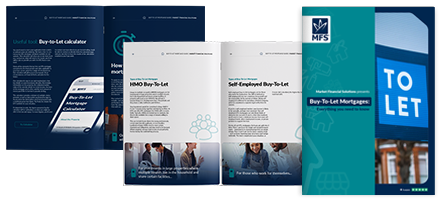Market Financial Solutions are a bridging loan and buy-to-let mortgage provider and are not legal, financial, investment or tax advisers. This document is for informational purposes only and does not, and should not be considered, to constitute legal, financial, investment or tax advice or be relied upon by any person to make a legal, financial, investment or tax decision. Therefore, Investors are encouraged to seek appropriate professional advice. The information in this content is correct at time of writing.

The UK officially left the European Union on 31st January 2020, some four years after we had the original Brexit referendum. Since then, alongside the political and economic uncertainty the referendum initially caused, the UK’s housing market has also had to contend with a pandemic, a disastrous mini-budget, and a general election.
There have been a lot of adjustments made since 2020. The UK property market after Brexit has been swayed, but Brexit hasn’t had the impact many experts expected. This blog will outline how the UK property market fared after Brexit, and consider multiple aspects of the market. Additionally, we will assess what qualities investors and landlords should look for in a lender to help navigate the current investment landscape.
1. House Prices
While there have been temporary spikes and declines seen in recent years, UK property prices after Brexit have proven resilient over the long-term. In the build up to the vote, the government predicted that house prices would have fallen by 18%[1]. In reality, UK house prices grew by 35% between June 2016 and June 2024[2]. In the six years leading up to the referendum, the market only grew by 22.5%.
It’s worth noting that between 2017 and 2019 – when political uncertainty was perhaps at its highest – the market did begin to level off.
However, growth recovered once again post-Theresa May’s departure and throughout the pandemic. Perhaps political turmoil in Westminster had a greater bearing on the market than the choice to leave the EU.
Indeed, the fact remains that demand continues to outstrip supply, which is perhaps why prices continue to rise despite the political and economic factors at play. For example, in May 2022, the average price of a house reached £283,000, according to the Office for National Statistics (ONS[3]). In May 2021, this figure was £32,000 lower. Whilst prices increased by 1.2% between April and May 2022, the same period only saw 0.4% growth in 2021.
What’s clear is that because demand is so high, Brexit has not had the impact on prices many experts initially predicted. In fact, the UK property market after Brexit is set to improve dramatically. As a result of a rebounding economy, Savills[4] recently upgraded its house price forecast, with the average property expected to have £61,500 added to its value by 2028.
2. Regional impact
That said, prices do vary around the country. So, it’s important to recognise the regional differences at play in the market. The UK property market after Brexit isn’t in a homogenised state.
Historically, London property has outperformed the UK’s regions. However, London has lagged behind in recent years. For instance, in May 2022 house prices increased the most in the East Midlands at 42.3%,[5] whilst prices grew by 12.7% in London.
More recent data from Zoopla[6] showed the hotspots of the Southeast have struggled. Its June 2024 index showed annual house price declines in London (-0.3%), the South East (-1%), and the East of England (-1.2%). Meanwhile, prices rose in the North East (1.3%), the North West (1.5%), and Wales (1.1%).
In truth, affordability pressures and an adverse tax landscape have pressured London’s prices lower, but political volatility has certainly compounded these issues. In other words, Brexit may not be the key driver for this levelling up of the UK’s regions, but it likely has played a role in London’s dip in growth.
3. Transactions in the Market
A similarly useful metric for tracking how Brexit affected UK’s property investments, is transaction numbers. Whilst transactions did suffer following the 2017 general election that left Theresa May’s government without a working majority, the impact was less than initially forecast. Between July 2016 and May 2022, for instance, 7.24[7] million residential transactions were completed. That was a 14.4% rise (from 6.32 million) on the six years leading up to the referendum.
Of course, the pandemic had an initial impact on transactions. But the market soon recovered following the announcement of a stamp duty holiday which generated a reported 140,000[8] ‘extra’ transactions. Eventually, the property market also shook off the impact of the mini-budget[9].
Now, some four years after leaving the European Union, confidence in the market appears noticeably high. Recent data from HMRC[10] revealed the number of UK residential property transactions in May 2024 was 24% higher than the same month in 2023.
4. Levels of Investment
The level of investment into the UK’s property market can also demonstrate the impact of Brexit. For some time, overseas investors contributed a significant amount to UK real estate and London property. In fact, it’s estimated that 250,000 properties are registered to overseas buyers. This equates to around 1% of all residential titles. In 2010, however, this figure stood at 0.4%.[11] As such, it’s clear that investment from overseas grew during the Brexit period.
As opposed to Brexit, the last two years or so have been dominated instead by higher interest rates, and skyrocketing inflation. This has hampered demand somewhat from foreign nationals as well as domestic buyers.
Still, since the beginning of 2022, foreign investors have purchased £50bn worth of UK real estate, while selling £29bn worth. Meaning, there has been a positive net investment of £21bn, driven primarily by North Americans, Asians, and Europeans[12].
5. Performance of the Pound
Related to overseas investments is the performance of the pound. Following the Brexit referendum, the performance of sterling took a major hit as a result of political uncertainty. Consequently, a forex window appeared that made UK property a significantly cheaper option to overseas purchasers. The UK property market after Brexit was largely supported by overseas buyers.
In particular, USD investors benefitted from the collapse of the pound. This meant prime London property was effectively being sold at a discount of around 30%[13].
Again, more recent data suggests the pound is well on its way to recovery too. The pound recently hit its highest level against the dollar in a year[14].

6. Legislative Reform as a Result of Brexit
Over the past few years, the buy-to-let (BTL) market has experienced several notable reform changes. Those which will have impacted property investors and landlords include:
- April 2016: an additional 3% stamp duty surcharge is introduced for second homes.
- April 2017: a tapered reduction in mortgage interest tax relief is introduced, leading to its removal in 2021. Landlords now receive a 20% tax credit. This means that those paying basic rates will be unaffected. However, landlords who pay higher and additional rates will pay more.
- October 2018: new regulations are brought in for houses in multiple occupation (HMOs). The changes included prohibiting landlords from renting rooms with less than 6.51m² to single adults. For two adults, the figure increased to 10.22m².
- April 2019: the Government tables a motion to abolish section 21 of the Housing Act 1988. It announces that “private landlords will no longer be able to evict tenants from their homes at short notice and without good reason”. In May 2021 it was confirmed that the Bill was to be brought forward to establish this reform.
- March 2020: in response to the Covid-19 pandemic, with many tenants placed on the Furlough scheme, the Government introduced The Coronavirus Act 2020. It protected tenants by delaying landlords’ ability to evict. Landlords had to provide six months’ notice before starting the process (this was in place from August 2020 to June 2021).
This series of reforms has caused landlords to reassess how they invest and manage their portfolios. For instance, the new HMO regulations resulted in significant refurbishment and renovation activity, as landlords sought to bring their properties in line with the new regulations.
One could argue that instead of Brexit affecting UK property investments, Britain’s own legislative choices and reforms impacted the market. In fact, EU laws are likely to have less of an impact on the UK economy going forward. By the end of 2023, nearly 600 pieces of EU-derived legislation were revoked[15].
7. UK Property Investment Post-Brexit
Whether buying a property or renovating one, it is vital that brokers and investors find the right financial products to finance their investments post-Brexit. So, what qualities should their loan provider possess?
Firstly, Brexit and legislative reforms have increased the complexity of the UK property market, so lender flexibility is key. Here at Market Financial Solutions, our financial products offer investors and landlords a wide range of financial options to cater for any investment.
Whether it’s to complete a property sale or free up funds for another investment opportunity, our underwriters treat each loan application on a case-by-case basis and underwrite from day one. In doing so, we take all aspects of an application and investment opportunity into consideration. As such, we can take on cases other lenders would struggle to process due to their tick box driven lending criteria.
Secondly, the competitive nature of the UK’s property market requires landlords and investors to move quickly, so lender speed is vital. At Market Financial Solutions, we can complete deals in as little as three days, alleviating the stress of a quick turnaround. With our Auction Bridging Loans, we can help auction-winning landlords complete a purchase within the 28-day deadline. Alternatively, if a developer needs to repay a development finance loan, our Development Exit loans can give them breathing space to find buyers or complete the renovation of a property.
Finally, investors – overseas or otherwise – must feel secure when taking out a loan to complete an investment opportunity. As such, lender transparency is key. At Market Financial Solutions, client trust is very important to us, which is why we provide indicative loan terms upfront so our clients can invest with confidence. Once we agree to these terms – we never adjust the rates or go back on a deal.
Looking ahead, getting on top of these concerns will likely prove paramount from both a domestic and international perspective. The UK commercial property market alone is now starting to recover faster than its European counterparts[16].
What’s more, Greater London recorded 359 foreign direct investment (FDI) projects in 2023, making it Europe’s highest performing region for investment[17]. According to an EY investor survey, a record 69% intend to invest in the UK in 2024.
We could also be on the verge of a more prosperous, and harmonious relationship with the EU. Keir Starmer plans to “reset relations” with the EU, while EU leaders are “open-minded[18]” about their future relationship with the UK. We will be ready for whatever the future holds for our relationship with Europe and the rest of the world at Market Financial Solutions.
The Complete Guide to
Buy-to-Let Mortgages
Everything you need to know
- Fundamentals
- Different mortgage types
- Useful tools
- Industry stats & more
[1] https://www.knightfrank.com/research/article/2022-06-23-brexit-six-years-on-assessing-the-impact-on-uk-housing
[2] https://landregistry.data.gov.uk/app/ukhpi/browse?from=2016-06-01&location=http%3A%2F%2Flandregistry.data.gov.uk%2Fid%2Fregion%2Funited-kingdom&to=2024-08-01&lang=en
[3] https://www.ons.gov.uk/economy/inflationandpriceindices/bulletins/housepriceindex/may2022#:~:text=Image%20.csv%20.xls-,The%20average%20UK%20house%20price%20was%20%C2%A3283%2C000%20in%20May,(April%20and%20May%202021)
[4] https://moneyweek.com/investments/property/house-prices-savills-forecast#:~:text=House%20price%20inflation%20is%20then,predicted%20in%20Savills%20last%20forecast
[5] https://www.buyassociationgroup.com/en-gb/news/brexit-housing-market-six/
[6] https://www.zoopla.co.uk/discover/property-news/house-price-index/
[7] https://www.knightfrank.com/research/article/2022-06-23-brexit-six-years-on-assessing-the-impact-on-uk-housing
[8] https://www.ftadviser.com/mortgages/2021/07/16/stamp-duty-holiday-generates-140-000-extra-transactions/
[9] https://www.knightfrank.com/research/article/2023-05-16-uk-property-market-finally-shakes-off-the-minibudget
[10] https://todaysconveyancer.co.uk/property-transactions-24-higher-compared-with-the-same-period-last-year-data-reveals/
[11] https://beechholdings.co.uk/news/the-impact-of-brexit-on-uk-property-investment/
[12] https://www.cbre.co.uk/insights/articles/is-foreign-investment-in-uk-real-estate-rising-despite-the-downturn#:~:text=Looking%20at%20net%20investment%20trends,net%20investment%20of%20%C2%A321bn
[13] https://www.propertyinvestortoday.co.uk/breaking-news/2023/1/prime-london-properties-attract-top-dollar
[14] https://www.bbc.co.uk/news/articles/c80e9k4wegno
[15] https://commonslibrary.parliament.uk/which-retained-eu-laws-will-expire-at-the-end-of-2023/
[16] https://www.ft.com/content/311ecfb6-941f-4319-9843-7e5ff55e9a92
[17] https://www.ey.com/en_uk/news/2024/07/foreign-direct-investment-in-uk-grows-as-europe-declines
[18] https://www.theguardian.com/world/article/2024/jul/15/eu-leaders-open-minded-future-relations-uk-post-brexit-epc






